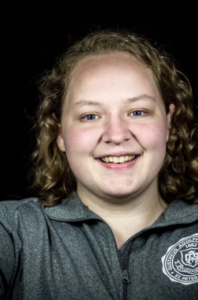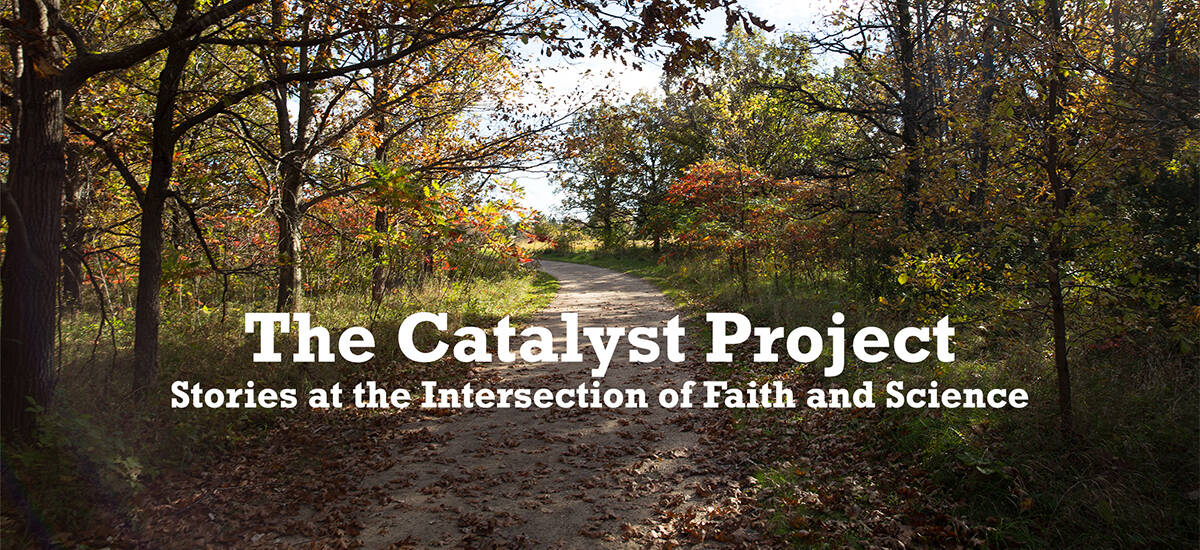
Savannah has always always been interested in science, and she has known that she wanted to go into medicine since she was little. She says that while others used to say “I want to be a ballerina,” or “I want to be a fairy,” she has always said “I want to be a doctor”. Savannah is deeply intrigued by the science of life and by other doctors. After Gustavus, she plans to continue on to medical school to be a family-practice doctor, pediatrician, or obstetrician. Savannah wants to work somewhere that she can be in a clinic and use her knowledge of science and medicine to help people over many years. She would like to be able to get to know her patients better than seeing them in a one-time setting like an emergency room.
Because Biology is the study of life, Savannah sees her discipline as a means to help others understand their own lives, bodies, and health. One of Savannah’s gifts is that she is a very good listener, and she likes to know everything she can about a person. Rather than just knowing someone peripherally, she wants to know who they are, what drives them, and what might be wrong with them so that she can help. Her desire to help others with their problems involves stepping in to alleviate stress, whether someone has anxiety over a test, needs a hug, is experiencing roommate drama, or is even raising questions about the future. As a doctor, Savannah wants to use her gift of listening with compassion to help people.
Savannah’s mom is a nurse practitioner in Minneapolis, and is one of the most influential people in her life. Savannah has grown up listening to her mom, hearing about her patients and work in the hospital, and being inspired by her determination. Savannah’s mom worked through college, living at home to save money, and worked very hard so that she could put herself through her undergraduate years. She then became a nurse right away, was a military wife while Savannah’s dad was in the Navy, and overall has done everything she possibly could to get herself to where she wanted to be. She is the first of her family to graduate from college, which is a testament to her drive for excellence. Savannah has been inspired by her mom’s story of overcoming hardship and rising up and the compassion and care she has for her patients, which motivates Savannah to have the same compassion for her own patients.
Savannah has a strong faith in the Lutheran tradition, and this is one of the beliefs that defines her. She grew up going to church, was in the high school choir that sang every Sunday, and went to church summer camps. Savannah also reflects that while she has some uncertainties in her faith, she is always grounded by the golden rule of doing unto others as she would have them do to her. Savannah notes that this rule is very important in society today, as there tends to be a theme of selfishness, where people think soley about themselves or the United States, as opposed to international relations. One of the most foundational themes of Christianity in Savannah’s life is the idea to care for others. Being nice to one’s neighbors and treating everyone with kindness, respect, and compassion is how she wants to be treated, and she knows that this attitude can make the world a better place.
In Biology, Savannah notes that a common belief is searching for the truth. This relates to her belief that a Christian looks for truth in Christ, Heaven, God, and the Holy Spirit. Truth, to her, involves “why” questions, like “why does this gene do this in the body?” or “why does this ecosystem react to a factor in a certain way?”. Biology is the science of life, and so the search for truth, from the smallest cells all the way up to the largest ecosystems and how they work, why they work that way, and what the purpose of them working that way is, are questions essential to Biology.
A scientific issue that scares Savannah is the simple yet immensely complex reality that humans can change things. She notes that conversations at the Nobel Conference about Reproductive Technology brought up potential for good and ways that we can help people. But for Savannah, it is also terrifying to consider where people will draw the line with “how far do we go?”. She gives the example of helping cancer patients with technology versus the creation of “super humans”. Savannah notes that the ethical boundaries of reproductive technology could be different for a scientist, a Christian, or anyone else who has different beliefs. Everyone’s “lines” of ethics differ, and it is terrifying for Savannah to consider how society is going to navigate these disagreements. While there may be frightening uncharted waters in the future of reproductive technology, Savannah thinks that at the same time there are awesome implications that people can take positive steps.
A biblical issue that scares Savannah as she pursues her vocation deals with the story of creation, where we came from, and the discrepancy of the Christian tradition in the context of evolution. Understanding how these two perspectives might mix together and where the similarities meet, as well as considering the obvious differences, can be terrifying. Savannah likes to know the truth, which is common in science. Because of this, having such a grand disparity and attempting to mix that in her mind is challenging. Savannah believes that God created the world and believes the stories in the Bible, but she also believes in the evidence and truth that comes from the theories of evolution. Another faith issue that concerns Savannah is what happens when people die. Biologically, she knows what physically happens to a body. But then there is the whole other side in Christian faith of Heaven and living with Christ when one dies. Like the evolution issue, Savannah thinks that there are two sides and no one can say with complete certainty how they intersect. With these challenges, it is scary for her to consider the differences because she does not exactly know how to mix the two perspectives.
As Savannah has pursued her vocation, her beliefs haven’t changed dramatically. However, she has become more comfortable saying that she is a religious person. She says that in many contexts, if one enters a scientific setting and states that they are a Christian there is a negative reaction. She thinks that there might be fear that “they tamper with our evidence to make it more ‘Christian’”. Sometimes there is a stigma against being a Christian in science, but Savannah is confident in her beliefs. In her pursuit of her vocation, she has grown more comfortable in stating that she is a Christian.
Savannah’s pursuit of her vocation is informed by her faith through what the Bible says about how we should be as human beings: that we should be compassionate, care for one another, and follow the path of Christ and how he respected everyone.This path and outlook relates to Savannah’s desire to be as a doctor. She wants to be compassionate, care for other people, and put others before herself because she thinks that the world needs this in science and medicine. Going into medicine, for Savannah, is about being there for others. Embracing the Christian tradition in order to embrace who she wants to be as a person informs who Savannah wants to be as a doctor.
